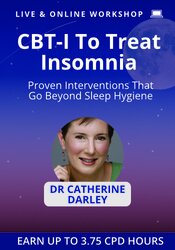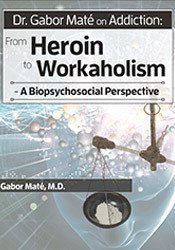Enrol in an online course today for flexible, self-paced learning—no fixed schedule required. Plus, enjoy lifetime access to course materials for convenient revisiting.


-
 Online CourseFrank Anderson’s Master Class in Internal Family Systems Therapy£129.98£999.98Frank Anderson’s Master Class in Internal Family Systems Therapy29 Jan, 2024Frank Anderson’s Master Class in Internal Family Systems Therapy£129.98£999.98 value
Online CourseFrank Anderson’s Master Class in Internal Family Systems Therapy£129.98£999.98Frank Anderson’s Master Class in Internal Family Systems Therapy29 Jan, 2024Frank Anderson’s Master Class in Internal Family Systems Therapy£129.98£999.98 value -
Live Events
In-Person or Online— learn with others, ask questions, and use your attendance to earn your CPD.
 Online CourseDr Laurel Parnell’s Attachment-Focused EMDR Skills and Supervision Group£495.00£1,590.00Dr Laurel Parnell’s Attachment-Focused EMDR Skills and Supervision Group14 Jan, 2025Dr Laurel Parnell’s Attachment-Focused EMDR Skills and Supervision Group£495.00£1,590.00 value
Online CourseDr Laurel Parnell’s Attachment-Focused EMDR Skills and Supervision Group£495.00£1,590.00Dr Laurel Parnell’s Attachment-Focused EMDR Skills and Supervision Group14 Jan, 2025Dr Laurel Parnell’s Attachment-Focused EMDR Skills and Supervision Group£495.00£1,590.00 value -
-
Books
Discover the transformative insights from renowned authors like Judith Matz, Amy Pershing, and Christy Harrison. Explore their works to gain a deeper understanding of mental health, and more.
 BookWritten by three leading experts in the fields of disordered eating, mental health, and trauma-informed care, this book will become your go-to guide for learning how to reject diet culture, heal your£18.99Written by three leading experts in the fields of disordered eating, mental health, and trauma-informed care, this book will become your go-to guide for learning how to reject diet culture, heal your20 Feb, 2024Written by three leading experts in the fields of disordered eating, mental health, and trauma-informed care, this book will become your go-to guide for learning how to reject diet culture, heal your£18.99
BookWritten by three leading experts in the fields of disordered eating, mental health, and trauma-informed care, this book will become your go-to guide for learning how to reject diet culture, heal your£18.99Written by three leading experts in the fields of disordered eating, mental health, and trauma-informed care, this book will become your go-to guide for learning how to reject diet culture, heal your20 Feb, 2024Written by three leading experts in the fields of disordered eating, mental health, and trauma-informed care, this book will become your go-to guide for learning how to reject diet culture, heal your£18.99 -
CPD Resources
Get expert guidance, practical workbooks, online courses, and more.
 Online CourseCBT-I To Treat Insomnia: Proven Interventions That Go Beyond Sleep Hygiene£0.00£149.00CBT-I To Treat Insomnia: Proven Interventions That Go Beyond Sleep Hygiene12 Dec, 2024CBT-I To Treat Insomnia: Proven Interventions That Go Beyond Sleep Hygiene£0.00£149.00 value
Online CourseCBT-I To Treat Insomnia: Proven Interventions That Go Beyond Sleep Hygiene£0.00£149.00CBT-I To Treat Insomnia: Proven Interventions That Go Beyond Sleep Hygiene12 Dec, 2024CBT-I To Treat Insomnia: Proven Interventions That Go Beyond Sleep Hygiene£0.00£149.00 value -
Staff Training
We specialise in meeting the unique training needs of individual teams, bringing staff members together to benefit from the latest therapeutic knowledge, insights and skills. Access a wide range of trainings from the latest trauma treatment modalities, child and adolescent trainings and many more.
×














